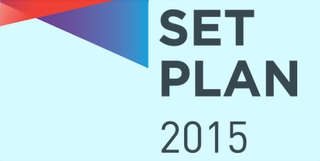On 22 September 2015, the second day of the 8th SET Plan conference held in Luxembourg, which sought to strengthen work on the Strategic Energy Technology Plan (SET Plan), concluded with two speeches: one by the Luxembourg Minister of the Economy, Etienne Schneider, and one by the European Commissioner for Climate Action and Energy, Miguel Arias Cañete. Etienne Schneider stressed that the EU has "a lot to gain" from research and innovation in the energy field, before insisting on "the urgency to progress faster" in this field. Miguel Arias Cañete highlighted the importance of strengthening cross-border and cross-sector integration in research and innovation in the energy field.
For Etienne Schneider, the EU has "a lot to gain" from research and innovation in the energy field
 "The lively debates you had reflect the central role which research and innovation in the energy field must play in the construction of the Energy Union", commended the Luxembourg Minister by way of an introduction. He believes that "it is the field which should provide our society with the technological tools that connect European objectives" such as "economic growth, employment, industrial and climate leadership and environmental protection".
"The lively debates you had reflect the central role which research and innovation in the energy field must play in the construction of the Energy Union", commended the Luxembourg Minister by way of an introduction. He believes that "it is the field which should provide our society with the technological tools that connect European objectives" such as "economic growth, employment, industrial and climate leadership and environmental protection".
Etienne Schneider highlighted the fact that the EU has "a lot to gain" from research and innovation in the energy field, before insisting on "the urgency to progress faster" in the field. He is convinced that these fields are among the most promising sectors for economic growth and job creation in the decades ahead.
With regard to the new SET-Plan adopted by the European Commission on 17 September 2015, the Minister recalled the four common priorities around which actions should be grouped in the Energy Research and Innovation field: "being the world leader in renewable energy technologies; empowering the consumer through a smart energy system; increasing energy efficiency from households to industries; and lastly, increasing sustainability of our transport systems, which represents some 40% of our energy consumption".
He takes the view that these four priorities pave the way to the "future-oriented agenda of Europe’s energy policy".
The approach proposed by the Commission will stimulate the strategic development of brainpower and know-how in European schools and universities. Moreover, it will equip Europe with "ever more performing tools for its energy transition" and "it will drastically reduce our heavy dependence on fossil fuels". That approach will benefit all industrial sectors by giving them a competitive boost, as well as households by decreasing their energy bills.
In terms of the UN Conference on Climate Change (COP21) in Paris in December 2015, Etienne Schneider recalled the commitment made by the Luxembourg Presidency with regard to the adoption of a binding global agreement. "The work done by the Commission on the Energy Union strategy and on the SET Plan is giving us a helpful hand in this context" because "it demonstrates to the global community that the EU takes climate change seriously and is working hard on solutions", stated the Minister.
Lastly, Etienne Schneider echoed the remarks made yesterday by Luxembourg's Prime Minister, Xavier Bettel, stressing the need for the Luxembourg Presidency to advance the energy transition.
Miguel Arias Cañete highlighted the importance of strengthening cross-border and cross-sector integration
The European Commissioner for Climate Action and Energy, Miguel Arias Cañete, also highlighted the importance of research and innovation in the energy field. "The message I shall convey to my colleagues is that we need a more targeted, integrated and transparent approach", he declared.
With regard to the SET-Plan, the Commissioner stated that it is based on three principles: "the need for a more integrated approach", "increased integration, transparency and accountability", and the need for "smart financing".
He stressed the importance of basing EU efforts on work which has already been undertaken by the Member States and to "build on" that work by strengthening cross-border and cross-sector integration. "Europe must be as strong as the sum of all its parts", he declared. He believes that increased transparency allowing Member States to "be aware of ongoing initiatives" would "avoid duplication".
With regard to the COP21, the Commissioner deems that, with the SET-Plan, "we are moving in the right direction". For example, thanks to advanced European technology, the cost of photovoltaic systems has decreased by nearly 50% in 40 years, whilst the cost of wind turbines has fallen by nearly a third over the same period, he explained. "This decrease in costs is due to the fact that we continue to innovate", explained Miguel Arias Cañete. "Our research on cleaner technologies allows us to do more with less", he said.
"But there is still a lot to do before we reach out targets", warned Miguel Arias Cañete, pointing to high rates of energy consumption in homes, buildings and the transport sector.
"Where there are common challenges, we need to pool our resources", added the Commissioner, before highlighting the importance of "prioritising areas with the greatest potential to help us achieve our goals".

